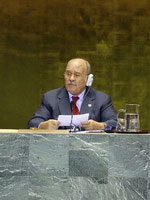President of the 63rd Session of the General Assembly
H.E. Mr. Miguel d'Escoto Brockmann
23 September 2008
- Video: English | Spanish [RealPlayer - 15 min]
- Statement: English | Spanish [PDF]
- Back to the list of speakers
Statement Summary

© UN Photo
Click for caption and to enlarge
MIGUEL D’ESCOTO BROCKMANN (Nicaragua), acknowledging the large scale and interrelated crises facing the world today, called for Member States to seize the opportunity to work together collectively and cooperatively -- not by making speeches and statements of good intentions, but through concrete action based on the “golden rule” that guided humankind’s behaviour.
The United Nations’ illustrious history clearly reflected its many laudable actions. However, the fulfillment of its primary purpose -- eliminating war, achieving disarmament and ensuring international security –- had clearly failed. The pressing and man-made problems of climate change, efforts to privatize water, the build-up of arms, terrorism, human trafficking, the situation of Palestine, humanitarian aid, gender inequality, children in especially difficult circumstances such as armed conflict, as well as the fact that half the world are living in hunger and poverty, could be directly linked to the lack of democracy in the United Nations.
Noting that decisions with the most serious consequences did not go through the General Assembly, and that the wishes and resolutions of 95 per cent of the Organization's Members were viewed as “recommendations”, he expressed his belief that unless this changed, significant progress towards the targets established in the Millennium Declaration would be impeded. Indeed, if Member States did not choose a path of solidarity with one another, the very existence of the human race would continue to be jeopardized. “Either we love one another or we all perish; either we treat each other as brothers and sisters or we witness the beginning of the end of our human species.”
He reminded the Assembly delegations that the peoples of the entire world turned to the Member States and the gathering of Heads of State and Government to be assured of a universal commitment to defend the United Nations, to uphold the principle of the sovereign equality of all Member States, and for all Members to meet their Charter obligations so that the continued and successful efforts towards a world-wide peace be ensured and protected.
Recalling that 2009 was the International Year of Reconciliation, he urged Member States to determine to stop the arrogant attacks on one another and to adopt a mindset of reconciliation, collaboration and courageous forgiveness to those who had caused pain and suffering. “Forgiveness is never a sign of weakness,” he said, emphasizing that achieving broader levels of unity and solidarity would guarantee the possibility of a different and more prosperous world.
[Source: GA/10749]